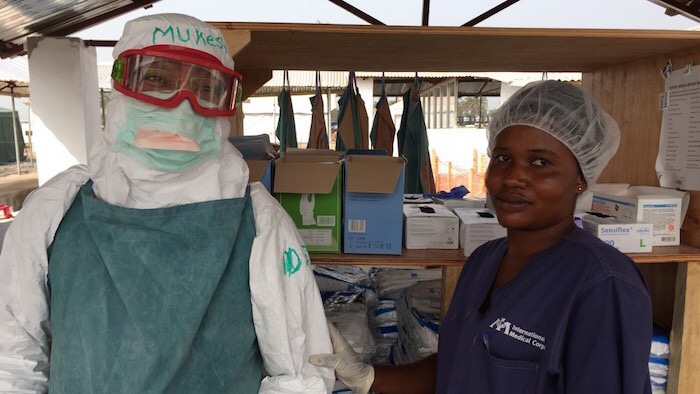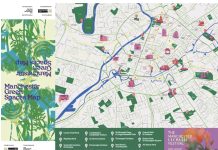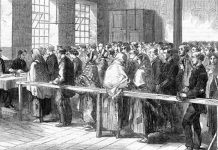Professor Mukesh Kapila, CBE is Professor of Global Health and Humanitarian Affairs at the University of Manchester.
He has just returned to Manchester from a fact finding mission with International Medical Core UK, looking at the battle against Ebola in Sierra Leone and Liberia.
About Manchester talked to him and took a look behind the media hype as well as discovering how our highly and own much maligned NHS is appreciated out there
The epidemic is over but now we must learn the lessons for the future says Professor Kapila as we meet on Grafton Street. He is carrying his medical kit, given to him as he arrived back in the UK, the previous weekend.” I have to take my temperature twice a day” .
The fact that he was screened at the airport, having flown back via Amsterdam, was proof enough that this country’s response to the crisis was working but hasn’t it been overhyped in the media?
Ebola, as far as we know, has been around for forty years on the African subcontinent and around fifty people a year have up to now contracted it. It kills most of the people that contract it.
Last year we were warned of a worldwide pandemic, with millions dying, spread by our almost instantaneous modern communications and porous borders.
Much of this says Professor Kapila was hype and the truth is far more complicated.
This latest outbreak was a result of modern communications but in East Africa, where new transport links built in the last five teen years, couple with increased urbanization meant the disease spread quickly from the countryside and without systems in place rapidly multiplied.
The reaction that followed saw many scientists predicted that by now there would be millions dead.
“When you overplay it it disempowers us, fear, prejudice and ignorance simply made the disease more serious.
The Ebola epidemic seems to have reached a turning point, as cases fall in all three of the worst-hit countries of west Africa, according to World Health Organisation figures.
Last week there were fewer than one hundred and fifty cases reported, with Sierra Leone accounting for most of them.The previous week it reported one hundred and eighty four cases and the week before two hundred and forty eight.
At the peak in December, the country was reporting over five hundred cases a week. Liberia’s case numbers have dropped from a high point of more than three hundred a week in August and September. This week it reported eight, while the total for Guinea was twenty.
Professor Kapila had previous been in the region five teen years ago and it was a different country, there are better roads ,better education and better hospitals but this actually worked to the benefit of the virus, especially as it is not spread unless the symptoms are showing.
In that part of Africa around twenty four thousand people had reportedly had the disease, the real numbers were probably higher and around eight thousand had died.
The massive effort in the past few months injecting money and technical knowledge in the region had helped.Much of it through the UK.Professor Kapila had gone to the region with International Medical Core UK and couldn’t praise the efforts of such organizations more highly, running emergency Ebola units in both Sierra Leone and Liberia.
Patients showing symptoms would be immediately isolated and blood samples would be taken with the results known within twenty four hours.
There is, he maintained no cure, instead the secret is making the body as strong as possible to fight it using vitamins, good food and most importantly rehydration.With these systems in place, death rates have fallen from around eighty to fifty to sixty per cent. Until recently ten per cent of all deaths had been health care workers.
It was more risky being a front line health care worker than a soldier
Treatment is is a learning process, he emphasizes, almost trial and error and hardly a hospital or clinic have not lost a health care worker.
There has been a lot of talk about a vaccine but Professor Kapila is sceptical and puts the cure down to all round treatment.The Ebola crisis has stimulated much research into possible vaccines but we don’t know how effective it is, how it could be distributed and how long it can last.The best treatment, he argues is more investment in public health.
Which brings us to what lessons have been learnt?
It is wake up call for the failure to invest in basic public health systems.The first reporting of outbreaks took four months by which time, the disease had disseminated across three countries.
But even more importantly he says, it is not that there has been no investment in health.The West spent a lot of money on post conflict repair but then it left the region in the early 2000’s.
It takes generations to build countries and systems.Our NHS is seventy years old and we are still learning.People and countries are not projects but are continuous and if you want sustainability, the West need to stay for a generation.That doesn’t mean that it needs to invest huge sums in every year but as we live in a globalized world , as the epidemic shows, it is in our own self interest.
More people die of malaria than Ebola, a fact that has been exasperated by the fact that during the crisis hospitals closed down and general day to day conditions were not being treated.
Finally as we in this country debate the future of our own National Health service, Professor Kapila says we should learn a very important lesson from the crisis.
While we complain about the service we get in this country, Prof Kapila was extremely impressed with our NHS people out there.
They brought values that placed the patient at the centre of the treatment,their teamwork was excellent and in relative terms they were very good at working with minimal resources, far below the shortages that we talk about here.
This is the embodiment of our NHS, the best in the world.
As for the future we can but hope that it will be a new and better world. The Chinese words for a disaster and an opportunity are the same and maybe this will lead to a re-enigising of the region.







